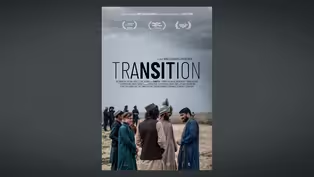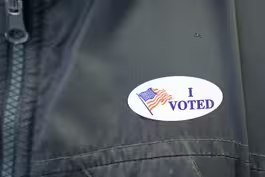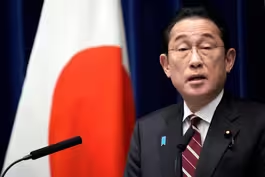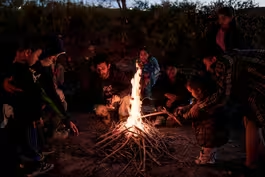
Biden warns Israel to protect civilians, aid workers in Gaza
Clip: 4/4/2024 | 4m 40sVideo has Closed Captions
Biden warns Israel to protect civilians, aid workers in Gaza or risk losing U.S. support
President Biden is warning Israel that U.S. support for the war in Gaza depends on new efforts to protect civilians and aid workers. Biden spoke with Israeli Prime Minister Netanyahu in a phone call Thursday following Monday's airstrike that killed seven humanitarian workers in Gaza. The White House said the president told Netanyahu an immediate ceasefire is essential. Nick Schifrin reports.
Problems playing video? | Closed Captioning Feedback
Problems playing video? | Closed Captioning Feedback
Major corporate funding for the PBS News Hour is provided by BDO, BNSF, Consumer Cellular, American Cruise Lines, and Raymond James. Funding for the PBS NewsHour Weekend is provided by...

Biden warns Israel to protect civilians, aid workers in Gaza
Clip: 4/4/2024 | 4m 40sVideo has Closed Captions
President Biden is warning Israel that U.S. support for the war in Gaza depends on new efforts to protect civilians and aid workers. Biden spoke with Israeli Prime Minister Netanyahu in a phone call Thursday following Monday's airstrike that killed seven humanitarian workers in Gaza. The White House said the president told Netanyahu an immediate ceasefire is essential. Nick Schifrin reports.
Problems playing video? | Closed Captioning Feedback
How to Watch PBS News Hour
PBS News Hour is available to stream on pbs.org and the free PBS App, available on iPhone, Apple TV, Android TV, Android smartphones, Amazon Fire TV, Amazon Fire Tablet, Roku, Samsung Smart TV, and Vizio.
Providing Support for PBS.org
Learn Moreabout PBS online sponsorshipGEOFF BENNETT: Welcome to the "NewsHour."
Today, for the first time, President Biden publicly threatened to condition support for Israel.
His remark came in a phone call with Israeli Prime Minister Benjamin Netanyahu.
The president said his future policy was dependent on whether Israel took multiple steps to ease the civilian suffering in Gaza.
He also reiterated his call for an immediate cease-fire.
Following all of this is our Nick Schifrin.
Nick,it's great to have you here.
And, look, as you well know, White House readouts of presidential phone calls with foreign leaders aren't always that illuminating, but we actually learned a lot today from the official White House summary of the call between President Biden and Netanyahu.
Tell us what you have learned.
NICK SCHIFRIN: The White House readout, but also U.S. officials who I have been talking to tell me that the president was -- quote - - "very direct" with the prime minister.
And the president said that following that killing of the World Central Kitchen aid workers -- you see the car that they were traveling in -- following the three cars that they were traveling in were hit by Israeli munitions, Biden said Israel had to, one, better protect aid workers, two, better protect civilians, and, three, reduce humanitarian suffering.
And this is a quote from that White House readout -- quote -- "President Biden made clear that U.S. policy with respect to Gaza will be determined by our assessment of Israel's immediate action on those three steps."
President Biden has not made that threat, at least publicly available, until now.
And until now, he said that, if he had a red line, that red line would be a full-scale military operation by Israel into Rafah.
That's what you see right there, where 1.4 million Gazans have fled.
And a few minutes after President Biden's call with Netanyahu, Secretary of State Antony Blinken, who was on that call listening both to the president and the prime minister, was even more blunt.
ANTONY BLINKEN, U.S. Secretary of State: If we don't see the changes that we need to see, there will be changes in our own policy.
NICK SCHIFRIN: Blinken also said something that he has not said before, that Israel's priority in Gaza is not, or at this moment, should be fighting Hamas or even protecting Israeli territory.
Those are the phrases that the U.S. has used in the past.
But, instead, Israel's priority in Gaza is this: ANTONY BLINKEN: Right now, there is no higher priority in Gaza than protecting civilians, surging humanitarian assistance, and ensuring the security of those who provide it.
Israel must meet this moment.
NICK SCHIFRIN: Israel has not responded to these statements publicly yet, but it has argued that the limiting of humanitarian aid is not its fault, but the fault of a lack of U.N. capacity in terms of distribution of aid inside of Gaza.
It called the killing of those aid workers inadvertent, the product of a misidentification, and it's promised exactly what President Biden is calling for, Geoff, an independent, open investigation.
GEOFF BENNETT: And the president also called for a cease-fire.
The explicit nature of that demand is noteworthy.
NICK SCHIFRIN: It is, because, up until now, the president has largely said there should be a cease-fire as part of a hostage deal.
And, again, a U.S. official tells me he was "very direct" -- quote unquote -- with the prime minister on this.
There is a hostage deal on the table, as you and I have discussed; 35 to 40 hostages would be released from Hamas custody in exchange for a six-week cease-fire.
But Hamas has insisted that part of that deal must be to allow all of those Gazans in Rafah to return north into Northern Gaza.
Israel has resisted that Hamas demand because, in Northern Gaza, there are both hostages, Israel believes, but also Hamas militants.
And Israel has said that it's too hard to either save those hostages or kill all those Hamas militants if all those civilians were to flood back into Northern Gaza.
But, today, a U.S. official told me that President Biden told Netanyahu -- quote -- "Get the hostage deal done, no more posturing," even, Geoff, if that means allowing Gazan civilians to move north from Rafah.
And the president also urged Netanyahu to find a compromise on another sticking point, the exact number of Palestinian detainees, including those convicted of murder, who would be released from Israeli detention in exchange for those 35 to 45 -- 40 hostages.
How far Israel is willing to go on that compromise, and, frankly, how far or whether even Hamas is willing to make a compromise, a lot of U.S. officials are skeptical of that, remains to be seen.
GEOFF BENNETT: Such valuable reporting.
Nick Schifrin, thanks, as always.
NICK SCHIFRIN: Thank you.
Film captures gender transition of journalist in Afghanistan
Video has Closed Captions
Clip: 4/4/2024 | 7m 6s | Documentary captures journalist's gender transition while embedded with Taliban (7m 6s)
Growing concerns about bird flu cases in U.S. farm animals
Video has Closed Captions
Clip: 4/4/2024 | 6m 37s | Growing concerns about bird flu cases in U.S. farm animals and risk to humans (6m 37s)
How Biden and Trump are spending campaign advertising funds
Video has Closed Captions
Clip: 4/4/2024 | 5m 40s | How Biden and Trump are raising and spending their campaign advertising dollars (5m 40s)
Japanese PM on cooperation with U.S. to counter China
Video has Closed Captions
Clip: 4/4/2024 | 11m 48s | Japanese prime minister on strengthening military cooperation with U.S. to counter China (11m 48s)
What asylum-seekers face at border after grueling journey
Video has Closed Captions
Clip: 4/4/2024 | 11m 20s | What asylum-seekers face at the U.S. border after a grueling journey through Mexico (11m 20s)
Providing Support for PBS.org
Learn Moreabout PBS online sponsorship
- News and Public Affairs

FRONTLINE is investigative journalism that questions, explains and changes our world.

- News and Public Affairs

Amanpour and Company features conversations with leaders and decision makers.












Support for PBS provided by:
Major corporate funding for the PBS News Hour is provided by BDO, BNSF, Consumer Cellular, American Cruise Lines, and Raymond James. Funding for the PBS NewsHour Weekend is provided by...




